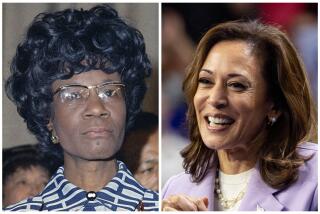For African first ladies, health issues are a chance to remake their image
- Share via
Dressed in sleek suits and eye-catching robes, 13 African first ladies stepped onto a Westside red carpet this week, mingling with Hollywood celebrities and waving to the paparazzi.
While they appeared to enjoy the limelight, the women had traveled to Los Angeles for a more serious purpose: to forge partnerships in the United States to improve health on a continent racked by AIDS, malaria and other scourges.
Although U.S. first ladies highlight personal causes while in the White House, it is less familiar territory for their African counterparts, who are better known for lavish shopping sprees.
“Most of the first ladies I have met are older women,” said Sia Nyama Koroma, whose insurance-executive husband was elected president of Sierra Leone in 2007. “Some of them are quite satisfied to settle into the regal role [and] luxury of being a first lady.”
Koroma, 51, is part of a new generation of educated professionals who want to use their positions to make changes.
“As first ladies, people listen to us, people want to see us, the crowd goes with us,” Koroma said.
And, she added with a laugh, “we are close to these presidents. . . . Whatever we tell them sticks in their head.”
Gery Ryan, a senior behavioral scientist at Rand Corp., said: “The first ladies are probably one of the largest untapped influences and influencers in these places.”
She participated in a panel encouraging the women to build a legacy that will outlast their term. But they struggle because they have no formal job descriptions, no budgets and no expertise in building effective programs.
In two days of meetings ending Tuesday, the first ladies were introduced to representatives from think tanks, aid organizations and corporate donors with that money and know-how.
Among those taking part were the World Health Organization, the Bill and Melinda Gates Foundation, Chevron and Exxon Mobil.
The conference was organized by the L.A.-based nonprofit US Doctors for Africa and by African Synergy Against AIDS and Suffering, an association of 22 African first ladies formed in 2002 to share ideas and experiences.
Drawn by the presence of Hollywood celebrities such as Sharon Stone, Diane Lane and Robin Wright Penn, television crews and photographers turned out at the welcome ceremony Monday.
A small army of volunteers held up blue and white umbrellas to shelter the first ladies and their celebrity escorts from the beating sun during a courtyard welcome ceremony.
“What I love about this conference is they called us saying: ‘We are here for you, how can we assist?’ ” said Inkhosikati LaMbikiza, one of at least 13 wives of Africa’s last absolute monarch, King Mswati III of Swaziland.
Although many of Africa’s poorest countries depend on foreign aid, there is frustration about being dictated to by the international community.
LaMbikiza’s husband has drawn criticism for spending lavishly on palaces and fancy cars for his wives when 70% of the country’s 1 million people live below the poverty line, and 42% of pregnant mothers test positive for HIV.
LaMbikiza does not hide her privilege, appearing in an ivory suit, spiky heels and designer sunglasses, but she has broken with convention for royal wives by qualifying as a lawyer and has devoted considerable energy to charitable work.
“A lot of the time you find women who are in positions of influence, but they do not use them,” she said. “Summits such as these help to sensitize ourselves: Do you realize where you are placed . . . you can move mountains.”
Koroma, who qualified as a psychiatric nurse while exiled in Britain during a decade-long civil war in which an estimated half a million Sierra Leoneans were systematically maimed, raped or killed, has worked to improve the mortality rate for mothers in her country.
According to the United Nations, one in eight Sierra Leonean women die in childbirth.
“No woman should die giving life. That is the legacy I want to leave for Sierra Leone,” she said in her suite at the Beverly Hilton Hotel.
Members of the international donor community said they were surprised to see the women present business-like reports on the challenges facing their countries.
At the end of the summit, the women -- including the Kenyan prime minister’s wife and the first ladies of Cameroon and Nigeria -- agreed to have teams of experts come to their countries to look critically at their programs.
Edith Jibunoh, of the One campaign against poverty and preventable diseases founded by U2’s Bono and others, left the summit excited about the possibility of collaborating with women who are role models in Africa.
“The impression you have is they are only interested in shopping and painting the town red,” Jibunoh said. “I never expected them to sit through two days of meetings so close to Rodeo Drive.”
--
More to Read
Sign up for Essential California
The most important California stories and recommendations in your inbox every morning.
You may occasionally receive promotional content from the Los Angeles Times.










